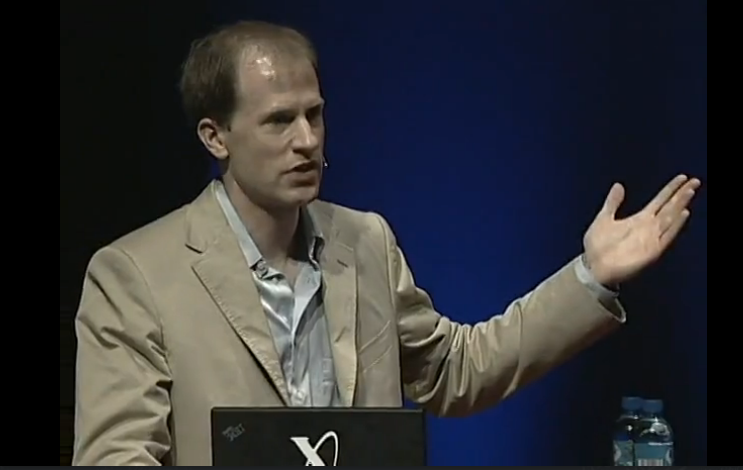Existential risk -- the second big problem.
存在風險——第二個重大問題。
Existential risk is a threat to human survival, or to the long-term potential of our species.
存在風險是對人類生存,或對整個人類種群的長遠潛能的一種威脅。
Now, why do I say that this is a big problem?
為什么我會認為這是一個重大問題?
Well, let's first look at the probability --
讓我們來看看可能性——
and this is very, very difficult to estimate
這非常難估量
but there have been only four studies on this in recent years, which is surprising.
但近年來,這個領域只出現了四篇研究文章,這很讓人吃驚。
You would think that it would be of some interest
你可能會認為,既然厲害關系如此巨大,
to try to find out more about this given that the stakes are so big,
那么在這個領域做研究一定是有意義的。
but it's a very neglected area.
然而,這是一個被人們忽視的領域。

But there have been four studies -- one by John Lesley, wrote a book on this.
但是,已經有了四篇研究——其中一篇由約翰·雷斯利所著,為這個問題寫了一本書。
He estimated a probability that we will fail to survive the current century: 50 percent.
據他估計,有50%的可能性我們會在這個世紀滅亡。
Similarly, the Astronomer Royal, whom we heard speak yesterday,
類似的,皇家天文學家--我們昨天聽過他的演講--
also has a 50 percent probability estimate.
的估算結果也是50%。
Another author doesn't give any numerical estimate,
另外一個作者并沒有給出任何數據估算,
but says the probability is significant that it will fail.
但他指出,人類滅亡的可能性非常高。
I wrote a long paper on this.
我就這個問題寫了一篇長篇論文
I said assigning a less than 20 percent probability would be a mistake in light of the current evidence we have.
我在文章里指出,根據現有的證據,任何低于20%的可能性估算都應該是錯誤的。
Now, the exact figures here, we should take with a big grain of salt,
對于這里的具體數字,我們不應該全盤相信,
but there seems to be a consensus that the risk is substantial.
但人們似乎對此達成共識,風險的確不小。
Everybody who has looked at this and studied it agrees.
每個看過并研究過這方面的人,都會同意。
Now, if we think about what just reducing
那么,如果我們考慮
the probability of human extinction by just one percentage point, not very much
將人類滅絕的可能性幾率只減少一個百分點,并不是很多
so that's equivalent to 60 million lives saved,
那就相當于拯救了六千萬的生命,
if we just count the currently living people, the current generation.
而這只是計算現存的人類,當代人口。
Now one percent of six billion people is equivalent to 60 million.
那么六十億人的百分之一相當于六千萬。
So that's a large number.
這是一個很大的數字。
If we were to take into account future generations
如果我們把未來的人口也算進來
that will never come into existence if we blow ourselves up,
如果我們把自己毀滅了,未來人口也永不會存在,
then the figure becomes astronomical.
那么這數字就變成天文數字了。
If we could eventually colonize a chunk of the universe -- the Virgo supercluster --
如果我們最終可以開拓宇宙的一角為生存地,比如室女座超星系團
maybe it will take us 100 million years to get there,
可能我們需要一億年才能到達那兒,
but if we go extinct we never will.
但如果我們滅亡了,我們永遠也到不了
Then, even a one percentage point reduction in the extinction risk
那么,即使是減少百分之一的滅絕風險,
could be equivalent to this astronomical number -- 10 to the power of 32.
那將等同于這個極為龐大的數字——10的32次方。
So if you take into account future generations as much as our own,
那么,如果你像關心我們自己一樣關心我們的后代,
every other moral imperative of philanthropic cost just becomes irrelevant.
所有其他基于道義責任的慈善都變得無關緊要。
The only thing you should focus on would be to reduce existential risk
你所應該關注的唯一事情就是減少生存風險
because even the tiniest decrease in existential risk
因為即使只減少極少的一點生存風險,
would just overwhelm any other benefit you could hope to achieve.
其帶來的好處也可以覆蓋其它任何你希望獲得的利益。
And even if you just look at the current people,
另外,如果你僅僅關注現在的人類,
and ignore the potential that would be lost if we went extinct,
而忽略那些一旦我們滅絕后可能失去的潛能,
it should still have a high priority.
減少存在風險也仍舊值得優先考慮。











